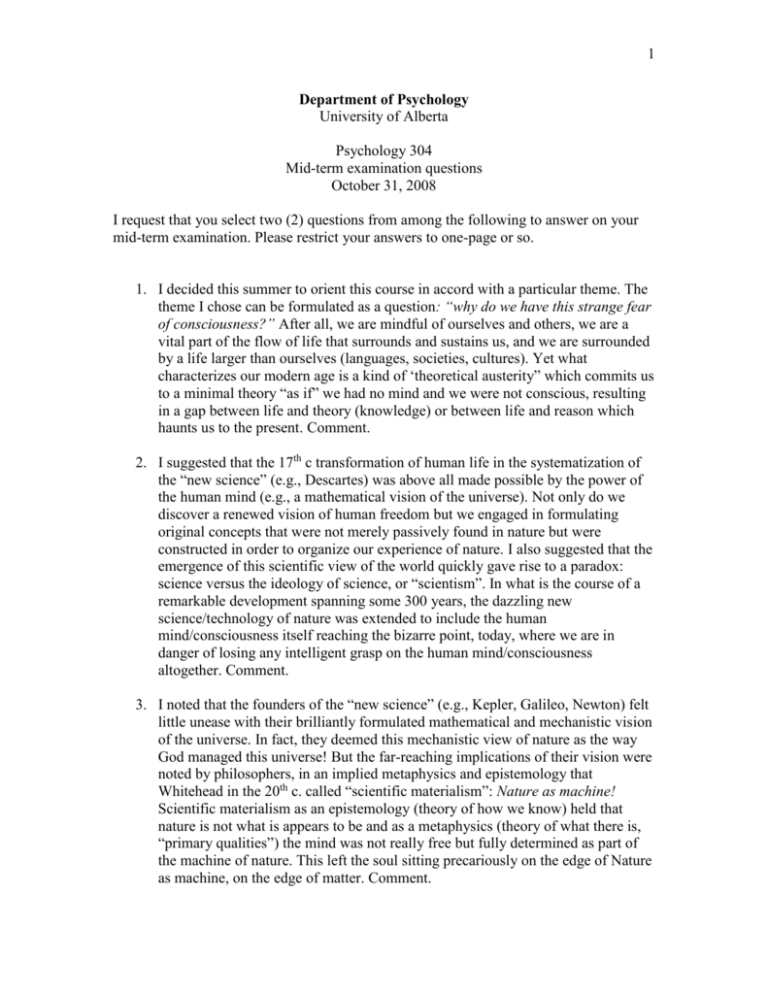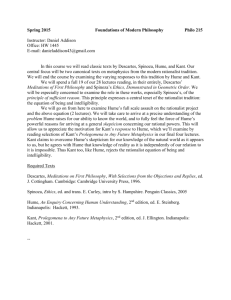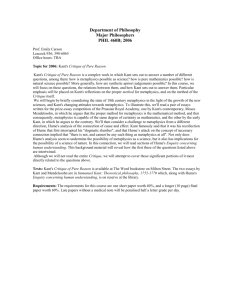Department of Psychology
advertisement

1 Department of Psychology University of Alberta Psychology 304 Mid-term examination questions October 31, 2008 I request that you select two (2) questions from among the following to answer on your mid-term examination. Please restrict your answers to one-page or so. 1. I decided this summer to orient this course in accord with a particular theme. The theme I chose can be formulated as a question: “why do we have this strange fear of consciousness?” After all, we are mindful of ourselves and others, we are a vital part of the flow of life that surrounds and sustains us, and we are surrounded by a life larger than ourselves (languages, societies, cultures). Yet what characterizes our modern age is a kind of ‘theoretical austerity” which commits us to a minimal theory “as if” we had no mind and we were not conscious, resulting in a gap between life and theory (knowledge) or between life and reason which haunts us to the present. Comment. 2. I suggested that the 17th c transformation of human life in the systematization of the “new science” (e.g., Descartes) was above all made possible by the power of the human mind (e.g., a mathematical vision of the universe). Not only do we discover a renewed vision of human freedom but we engaged in formulating original concepts that were not merely passively found in nature but were constructed in order to organize our experience of nature. I also suggested that the emergence of this scientific view of the world quickly gave rise to a paradox: science versus the ideology of science, or “scientism”. In what is the course of a remarkable development spanning some 300 years, the dazzling new science/technology of nature was extended to include the human mind/consciousness itself reaching the bizarre point, today, where we are in danger of losing any intelligent grasp on the human mind/consciousness altogether. Comment. 3. I noted that the founders of the “new science” (e.g., Kepler, Galileo, Newton) felt little unease with their brilliantly formulated mathematical and mechanistic vision of the universe. In fact, they deemed this mechanistic view of nature as the way God managed this universe! But the far-reaching implications of their vision were noted by philosophers, in an implied metaphysics and epistemology that Whitehead in the 20th c. called “scientific materialism”: Nature as machine! Scientific materialism as an epistemology (theory of how we know) held that nature is not what is appears to be and as a metaphysics (theory of what there is, “primary qualities”) the mind was not really free but fully determined as part of the machine of nature. This left the soul sitting precariously on the edge of Nature as machine, on the edge of matter. Comment. 2 4. The new science opened a universe so unimaginably vast, dislodging the earth, and humanity, from its privileged position in the cosmos, that it led Blaise Pascal (1623-1662), considered on of the greatest minds of the 17th c. and a mean mathematician and believing Christian, to utter “the eternal silence of those infinite spaces frightens me”. This cosmic alienation is also paradoxical insofar as Pascal in giving expression to his consciousness of this vastness also recognized that we are but an infinitesimally small part of this vastness of the universe. The question that arises is whether human reason can embrace this paradox (undo it), as, say in Leibnitz’ metaphysics, and so heal our alienation. Comment. 5. The 17th c is often seen as the century of reason (Enlightenment) bringing to fruition Francis Bacon’ glorious vision of the betterment of humankind. Of course, in a way this vision of the “new science” would eventually bring about such “betterment” during the next three centuries. Yet this 17th c ideal was quickly turned into a telos or ideology of the promise of “endless progress” which even now has not been fulfilled as is evident in all the tensions, uncertainties, and malaise of our modern age (or what Psychology has termed the age of “anxiety”). Indeed, I have alluded to the possibility that perhaps at some time in the future we may well regret that our minds are not preoccupied with the larger (religious) questions of “being and meaning”. Comment. 6. It was Descartes (1595-1650) who appreciated that the “new science” brought not only certainty (of reason/mathematics, e.g., in a Copernican vision of the universe) but also doubt (of the senses – the universe is not as it appears to be). If the senses cannot offer certainty, then it must be the “thinking I” that gives us certainty. However, Descartes’ “I think” was merely a starting point for his method of systematic doubt which would isolate an absolute starting point for thinking (“I cannot doubt the I that doubt’s – thinks”). In my criticism of Descartes, I did not so much criticize his effort to ground certainty in the “subjective” as I criticized his conception of the subjective “I” as an abstraction. For Descartes’ “I think” is a “logical move”; it is not the “I” as the embodiment of our memories, hopes, emotions, etc., living with others in community. Hence, Descartes’ split within the self between reason (soul-stuff) and body (matter-stuff) is paradoxically one between the self as reason (subject) and the self as lived (object) in which both are abstractions. Comment. 7. Leibnitz (1646-1716) clearly saw the problems surrounded Newton’s picture of the universe-as-machine and he also understood that Descartes’ striving after certainty in splitting reason off from the body was because Descartes held to the view of body as extension (mere matter). While Leibnitz’ view of monads (in place of “bits of moving matter”) may seem far fetched (perhaps less so today than back then), this radical new metaphysics in spiritualizing the body and soul in a psychophysical harmony, no longer leaves the soul precariously perched on the edge of matter, as the body is now spiritualized as a center of energy and destiny. Remarkably, while we today criticize Descartes mind–body dualism, it 3 was Leibnitz who reminded us that it was not Descartes’ view of mind that is a problem but especially our view of the body-as-matter that precludes the integrity of the self. Comment. 8. Leibnitz principle of “sufficient reason” in reply to his question “why is there anything at all rather than nothing?” reflects two persistent themes that are still troubling us today: (1) the separation of the self between soul (mind) and body, (to which Leibnitz’ “monadology” was an answer but which, of course, we longer accept) and (2) the mind and body as a psychophysical unit or monad in relation to the Divine (“sufficient reason”). It was Nietzsche who, in the 19th c. settled the latter when he asserted that “God is dead” leaving us with either an abstract mindbody dualism or materialism. Comment. 9. John Locke (1632-1704) aspires to follow the “plain historical method” in attempting to understand the mind – how do we and what can we know - in tracing the operations of the mind from sensations to ideas. Yet Locke also echoes Galileo’s distinction between primary and secondary qualities and maintains that only primary qualities are metaphysically real. This distinction results in empiricism’s bifurcation between the experiential world of life and the empirical world of science. This bifurcation which implies that the experiential world is always subordinate to the empirical world and that empiricism (the ideology of what is metaphysically real) is always an abstraction from experience (as Descartes’ “I” was an abstraction from the lived self). Comment. 10. Locke’s empiricism led Bishop Berkeley to his audacious claim, in an effort to recover the genuine experiential that was lost by Locke, that “esse est percipi” (being is perceiving). But surely reality is not so fickle as to depend on “perceiving it” (or reality cannot be so fickle as to depend on psychology). We have here in Berkeley’s opposition to, or better, in drawing out the conclusions of, Locke’s thesis, another contemporary tension between “experience” and “empirical” in psychology. Berkeley held that Locke, notwithstanding his claim that he started in the “plain historical method”, was not truly experiential but let his empiricism be guided by what was assumed to be real (sensations or “scientific materialism”) and proposed, instead, that whatever is real is ever only in the mind. Comment. 11. The atheist David Hume takes theist Berkeley seriously and suggests that the world is simply given as a set of impression out of which then reconstruct the world. That is, Hume maintains that knowledge, including knowledge of the “new science”, is grounded in the co-occurrences (associations) of impressions and that these, as “habits of mind”, are the basis of our knowing the world. Thus, for example, cause and effect are nothing but the contiguity of impressions and hence we are never logically justified in speaking of the world or its explanations as more than psychological habits. On this view, not only does Hume invite skepticism (our knowledge can never be certain but only psychological) but he also rids us of the mind as a mere “ghost in the machine” (there are only 4 impressions and their combinations). I suggested that this is a spectator (3rd person) view of the world (since obviously none of this is “experienced”) but it is one that was enormously influential in the 19th and the founding of psychology. Comment. 12. Immanuel Kant sought to rescue the “new science” from the skeptical consequences of Hume’s empiricist theory of knowledge. Kant begins from within, and hence accepts, the certainty of knowledge of the “new science”. He then separates himself from the dogmatic metaphysics, and theology, of Leibnitz. We have neither privileged access to what is real (metaphysics) beyond the phenomenal world nor can we simply leave scientific knowledge with the skeptical consequences of David Hume’s empiricism. Instead, Kant begins with the question of what role the mind plays in human life, including scientific knowledge (assuming that we do lead moral, religious, and scientific lives). In this way Kant confronts scientific materialism in rationalist metaphysical thinkers such as Descartes and Leibnitz but also in empiricist thinkers such as Locke and Hume who would extent the role of reason beyond the limit where Kant thought reason could possibly be valid (such as to attain knowledge). This is Kant’s “immanent critique”, namely, given that we do know and that we do act morally what apriori conditions of possibility must we assume “reason” gives to itself such that we can justify our knowledge of the world and what is moral. Comment. 13. One consequence of Kant’s critical philosophy is that he distinguishes between practical knowledge (reason in its practical use) and theoretical knowledge (reason in its theoretical use) giving priority to practical knowledge. In both kinds of knowledge Kant held that the subject or self essentially contributes to what is known, either theoretically or practically. In other words, unlike Descartes who splits the mind off from the body, Kant splits the human mind itself between our knowledge of the natural world (“the starry heavens above” in which I function just as part of the machine of nature) and the moral world (the “moral law within” in which I function as a free and responsible moral agent). Or, he claims that I am phenomenally determined but noumenally free (where, as you will recall, I cannot “know” the noumena but must presuppose it). Or, “what I ought to do” can never be derived or defined in terms of what “is”. These different ways of formulating the split with us is never adequately resolved by Kant but his efforts to limit reason, especially in his rejection of metaphysics, at least made room for the autonomy of morality (human freedom, and faith) in a world threatened by scientific materialism. Comment. 14. I suggested that Kant’s critical philosophy was a turning point in modernity, deeply affecting the course of the next two centuries. Yet Kant’s analysis remains formalistic and transcendental (apriori conditions of possibility of knowledge) and so he never comes to grips with the concrete embodied self that underlies the will that gives itself reason (or reason that gives itself the will). While there are no free-floating impressions or ideas in Kant (consciousness is always consciousness of the “transcendental ego”), neither is Kant’s ego “substantial” in the sense that 5 his transcendental ego adheres to the minimalist empiricist assertion that the “I” must be capable of accompanying reason. The reason is obvious because for Kant we can never know the thing-in-itself, including the self (it belongs to the noumenal world), and hence the mind or self cannot be known. Perhaps Kant pushed the requirements for knowledge too far (giving too much to Hume’s skepticism) thereby blurring the epistemological demands of knowledge and the existential demands of life. He tried to heed both but he also fell into the trap of believing that knowledge must be certain and complete (explanation) or else it is not knowledge. This either/or position in the 19th century would lead either the abandonment of mind altogether (scientific materialism or “positivism”) or else to idealism (Hegel). Comment. 15. Besides our ordinary and scientific knowledge of the world, Kant also claims that there is practical moral knowledge. But when, for example, we say that “one ought to tell the truth” we can ask what kind of knowledge this “ought” is especially as Kant maintains that even if it is an empirical fact that everybody lies we would still know that we ought to tell the truth. For Kant uncovering what this knowledge is implies that we must uncover the apriori element of moral law in making a moral judgment. This moral law which is universal must be grounded in reason alone, meaning that it must not consider empirical circumstances or derived from theology. This moral law (“categorical imperative”) is an end in itself – the objective ground of self-determination – and binding on all rational beings in willing the good. Hence, the will of every rational being is to make universal law (in making moral choice) and doing so demonstrates the autonomy of the will and the sole principle of all morality and duty. In short we should always act, as rational beings, such that our action could be valid as a principle making universal law. Comment. 16. Franz Joseph Gall, the discoverer of “organology”, was critical of the empiricist reliance on sensation and introspection and sought to bring objectivity to our understanding of the relation between mind and brain. He argued that since the brain was “organized” (as evidenced by his comparative studies of brains) so indeed should the mind be organized. Accordingly, he suggested that the faculties of mind which distinguished people (individual differences) were innate and corresponded to the developed “organs of the brain”. Thus while the faculties were common to all people, through individual differences in their use these faculties would develop very differently and this was evident in the structure of the organs of the brain as revealed by their appearance on the skull. In this way, Gall was not interested in the general nature of the mind (as were the empiricists in their focus on sensation, ideas, attention, and memory) but in individual differences in conduct, and he was objective in that everyone had these faculties and they were grounded in the brain. In this way Gall argued for the localization of function of the brain against the then fashionable “mass action” of brain function. Comment. 6 17. Electricity was as yet not well understood in the middle of the 18th c when Benjamin Franklin would begin to use the newly invented Leyden jars to deliver electrical sparks in service of healing various disorders. Franklin encouraged the experimental use of medical electricity and found that he was able to eliminate symptoms of hysteria, melancholia, and general nervous disorders (“lunacy”) by exiting sluggish nerves juices. Yet in his criticism of Franz Anton Mesmer’s claim about the existence of “animal gravity”, Franklin remained skeptical and indicated that perhaps Mesmer’s cures were brought about by “suggestion”. It is interesting to speculate that just perhaps the efficacy of electricity also had a suggestibility component. But in the light the Ugo Cerletti (1877-1963) and Lucio Bini (1908-1964) pioneering efforts with electro-convulsive hock therapy 150 years later, the efficacy of medical electricity seems to be confirmed. But then who is to say that “suggestibility” is not a form of medical treatment? “Comment. 18. Hegel radically eliminates Kant’s effort of limit the scope of reason such that Reason becomes Absolute and manifests itself in the realms of nature and spirit (mind, society, history). He then suggests that the human mind or spirit participates in the Absolute’s self-knowledge and that this process is a historical one wherein we can distinguish among different levels of consciousness, or Spirit: (a) consciousness as standing over and against the sensible object (nature), (b) self-consciousness as social consciousness (master-slave, or “other consciousness”), and (c) consciousness as the unity of consciousness and selfconsciousness in Reason. I suggested that it was Hegel’s brilliant insight to understand social consciousness which is the tension of two consciousnesses that would threaten to annihilate each other were it not for the fact that freedom requires recognition of and recognition by the “other”. Hegel notes that we can escape this dialectic only if we withdraw inwardly in what will become a divided (unhappy) consciousness. If we are to avoid the latter divided or Stoic consciousness, then we must overcome the contradiction of self-consciousness such that we come to recognize freedom both within ourselves and in others. This recognition is also consciousness of the infinite Spirit (Absolute) wherein we are bound as finite beings without our differences being annulled. This moral consciousness is one wherein the will expresses itself in an awareness of difference. Comment. LPM/October 21/08








